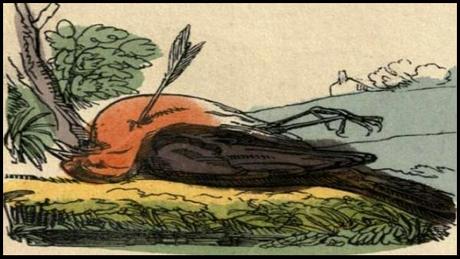Confessions in poetry might have begun there, but they certainly didn't end. Think of those 17th century Metaphysical poets like John Donne, heart battered by God, verses full of religious doubt about his own faith and worth, or some of the Romantics (as we mark the 200th anniversary of John Keats' death next week), even the Pre-Raphaelites and the Existential poets of the early 20th century versed in the treatises of Freud, Jung and company. The I, humankind, has been moving nearer to the center of his/her universe for centuries, after all.

Who killed Cock Robin?
I break out of my body this way,an annoying miracle. Could Iput the dream market on display?I am spread out. I crucify.My little plum is what you said.At night, alone, I marry the bed.
Then my black-eyed rival came.The lady of water, rising on the beach,a piano at her fingertips, shameon her lips and a flute's speech.And I was the knock-kneed broom instead.At night, alone, I marry the bed.
She took you the way a woman takesa bargain dress off the rackand I broke the way a stone breaks.I give back your books and fishing tack.Today's paper says that you are wed.At night, alone, I marry the bed.
The boys and girls are one tonight.They unbutton blouses. They unzip flies.They take off shoes. They turn off the light.The glimmering creatures are full of lies.They are eating each other. They are overfed.At night, alone, I marry the bed.I thought it was an extraordinary and fabulous composition when I was sixteen, that sestain (ababcc ) rhyme scheme, the striking imagery, the control of emotion, the aura of disillusion but the retention of a strong sense of self. I still hold it in high regard today, as you can probably tell.Sexton had only been writing poetry for just over a decade at that point (1969). 'Love Poems' was her fourth collection. She had won a Pulitzer Prize for her third work 'Live Or Die' in 1967. Within another few years she would be gone, committing suicide in 1974 aged just 45.

Anne Sexton with cigarette, coffee, 'confessions'
She knew she was going to take her own life, for she had appointed her elder daughter to be her literary executor just three months before she locked herself in the garage and turned on the car's engine. It was a life that had never been easy. Although she was glamorous, married for twenty-five years and with two daughters, she also suffered from severe bipolar disorder (in common with Robert Lowell and Sylvia Plath, both clinically depressed fellow 'confessionals'), a condition only compounded by severe post-natal depressions. She spent some time in mental institutions and from her mid-twenties was under the supervision of a psychiatrist. It was he who first suggested to Anne that she could try writing poetry as an antidote to depression, a way to help her grapple with her condition. According to her daughter, this advice freed her mother, giving her license to explore both her illness and her humanity. Hunched over her typewriter from mid-morning to the cocktail hour she wrote away, and the results were extraordinary. Eventually her psychiatrist suggested she might publish her work as it might help others in analysis to better understand their own mental issues. As Kurt Vonnegut (another of my favorite authors) stated: "Anne Sexton domesticates my terror, examines it and describes it...God love her."Beyond the themes of marriage, adultery, obsession, longing and heartbreak examined in the afore-mentioned 'Love Poems', Sexton's other poetry collections touched on many subjects that had formerly been off limits - childhood trauma, incest, depression and insanity, drug and alcohol addiction, motherhood, daughterhood, the highs and lows of her life, her frequent longing for death. I prefer to think of her poems, so honestly powerful in their emotional intimacy, as unfettered expressions of aspects of the human condition, rather than as 'confessions'. God love her, indeed.And so, if you're still with me, to something woody for the week-end from the imaginarium. After 300-plus Saturday blogs I like to try new things both to challenge myself and to keep it interesting for all. Consequently this time, you lucky lot, I've conjured up what looks like two poems but is in fact one poem in two languages, presented in parallel text mode in case your French doesn't come as readily as it might have back in the school-room. Let me tell you, it was the devil's only job getting the English version to left-justify. It works in full-screen laptop mode, the best way to view it, for it might just turn into scrambled egg (oeuf brouillé) when viewed on other devices like smart phones.

It matters not if you don't speak a word of French, though if you can read the poem in both tongues, you'll notice as a bonus that there are several deliberately playful discrepancies between the two texts. The composition is a literal and irony-laden take on confessional poetry, redolent of Frenchness (in my mind) and with a nod in the direction of noir movies. I couldn't resist the double-punning titles I've given to each rendition. I hope it all works for you. Enjoy.
The French Confection aka FCUK!Tu te souviens du jour où... Do you remember the day when...tu ne m'écoutes pas! but you're not paying attention AlfonseÇa te dérange si je fume? Merci. listen do you mind if I smoke?
Je vais commencer par le début. I'll start from the beginning Bien, j'allais à l’école en bus. so I used to get to school on the busIl pleuvait tout le temps. because it often rained.Le chauffeur était ta soeur. The bus driver was your sisterNous avions l’habitude de sourire we would smile at each otherles uns aux autres. and I don't think anybody else noticed. J’étais un solitaire I was a loner and I thought Je pensais qu’elle était aussi she was too in a pretty shy way Un jour, elle m’a conduit One day we drove to the woods dans les bois after the others were dropped offaprès que les autres ont été déposés. simple as that.
Nous l’avons fait sur la banquette arrière We did it on the back seat the first time. la première de nombreuses fois. Quand il ne pleuvait pas Often when it wasn't raining nous baiserions à l’extérieur, we would abase ourselves outdoors,elle avait un manteau à étendre sur le sol, she had a big coat that she would spread outelle ne s’est pas retenir she was like a beautiful tigressnous étions si heureux. and we were so fucking happy.
Tu te souviens du jour où Do you remember the day whenson mari a quitté la ville pour toujours? your brother-in-law left town for good?Ce n’était pas comme ça. He didn't really. I hadn't known till that day she was even married. Believe me.
Ce jour-là, nous avons entendu un bruit, That day we heard a noise,l’a trouvé caché dans une voiture jonchée found him hiding in a rusty old wrecknous regarder le faire. of a car just ogling us while we did it.
Elle a demandé combien de temps She demanded to know how longil avait été là, le bâtard he'd been spying on us the bastardet quand il a dit "je viens souvent" and when he said he often came to watch uselle est devenue folle she went crazyl’a traîné de la voiture dragged him from the caret ils se battaient sur le terrain. and they were fighting in the leaves and mud.
Je pensais qu’il allait l’étrangler I thought he was going to strangle her alors je l’ai frappé à la tête avec une clé so I cracked his nut with a spanner.C’est tout. Mort. Biff. Thud. That was it. He was a stiff.Nous avons empaqueté son corps We bundled his body into the rusty bootdans le coffre rouillé, and finished getting dressedet fini de s’habiller en silence. without saying another word. Ever.
Elle a pris son manteau She took her coatet est parti dans le bus and drove away in the busme laissant rentrer à pied. leaving me to lope off like a fox.Apres ca, j'ai regarde un feuilleton Afterwards I watched a soap on the box.a la television.
Pourquoi suis-je vous dire cela Why am I trying to get this all out now
après trente ans? after thirty years? Parce que vous êtes prêtre Because you are a priest Alfonseet j’ai entendu dire que votre sœur and I've heard that your sister is dying.est en train de mourir.Nous avons tous besoin de quelqu’un She will need someone to care for her soul pour prendre soin de nos âmes. even though she may not think so.
Thanks for reading (merci d'avoir lu). Do let me know what you think, S ;-) Email ThisBlogThis!Share to TwitterShare to Facebook
